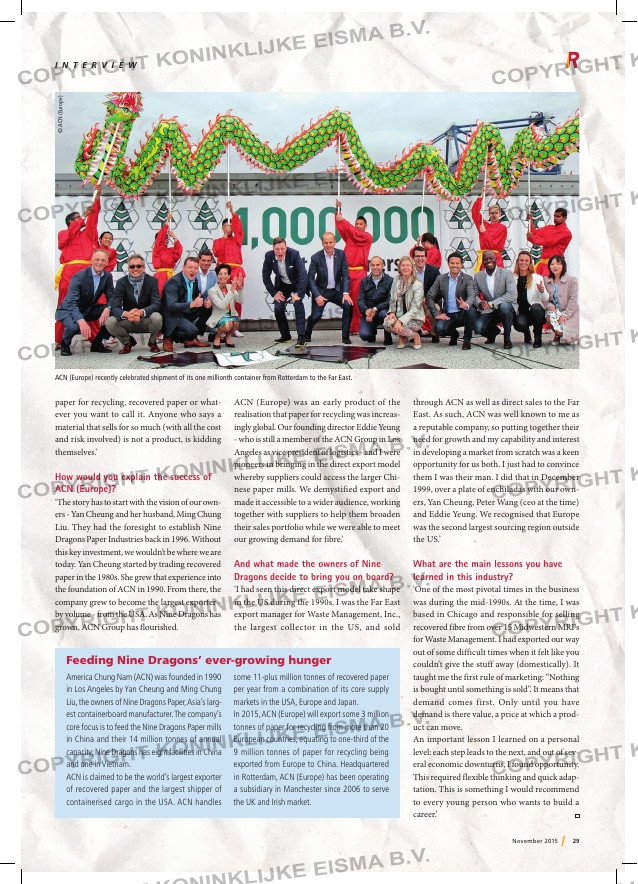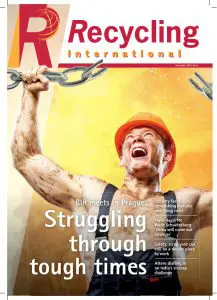Page 31 from: November 2015

29November 2015
I N T E R V I E W
paper for recycling, recovered paper or what-
ever you want to call it. Anyone who says a
material that sells for so much (with all the cost
and risk involved) is not a product, is kidding
themselves.’
How would you explain the success of
ACN (Europe)?
‘The story has to start with the vision of our own-
ers – Yan Cheung and her husband, Ming Chung
Liu. They had the foresight to establish Nine
Dragons Paper Industries back in 1996. Without
this key investment, we wouldn’t be where we are
today. Yan Cheung started by trading recovered
paper in the 1980s. She grew that experience into
the foundation of ACN in 1990. From there, the
company grew to become the largest exporter –
by volume – from the USA. As Nine Dragons has
grown, ACN Group has flourished.
ACN (Europe) was an early product of the
realisation that paper for recycling was increas-
ingly global. Our founding director Eddie Yeung
– who is still a member of the ACN Group in Los
Angeles as vice president of logistics – and I were
pioneers in bringing in the direct export model
whereby suppliers could access the larger Chi-
nese paper mills. We demystified export and
made it accessible to a wider audience, working
together with suppliers to help them broaden
their sales portfolio while we were able to meet
our growing demand for fibre.’
And what made the owners of Nine
Dragons decide to bring you on board?
‘I had seen this direct export model take shape
in the US during the 1990s. I was the Far East
export manager for Waste Management, Inc.,
the largest collector in the US, and sold
through ACN as well as direct sales to the Far
East. As such, ACN was well known to me as
a reputable company, so putting together their
need for growth and my capability and interest
in developing a market from scratch was a keen
opportunity for us both. I just had to convince
them I was their man. I did that in December
1999, over a plate of enchiladas with our own-
ers, Yan Cheung, Peter Wang (ceo at the time)
and Eddie Yeung. We recognised that Europe
was the second largest sourcing region outside
the US.’
What are the main lessons you have
learned in this industry?
‘One of the most pivotal times in the business
was during the mid-1990s. At the time, I was
based in Chicago and responsible for selling
recovered fibre from over 15 Midwestern MRFs
for Waste Management. I had exported our way
out of some difficult times when it felt like you
couldn’t give the stuff away (domestically). It
taught me the first rule of marketing: “Nothing
is bought until something is sold”. It means that
demand comes first. Only until you have
demand is there value, a price at which a prod-
uct can move.
An important lesson I learned on a personal
level: each step leads to the next, and out of sev-
eral economic downturns, I found opportunity.
This required flexible thinking and quick adap-
tation. This is something I would recommend
to every young person who wants to build a
career.’
Feeding Nine Dragons’ ever-growing hunger
America Chung Nam (ACN) was founded in 1990
in Los Angeles by Yan Cheung and Ming Chung
Liu, the owners of Nine Dragons Paper, Asia’s larg-
est containerboard manufacturer. The company’s
core focus is to feed the Nine Dragons Paper mills
in China and their 14 million tonnes of annual
capacity; Nine Dragons has eight facilities in China
and one in Vietnam.
ACN is claimed to be the world’s largest exporter
of recovered paper and the largest shipper of
containerised cargo in the USA. ACN handles
some 11-plus million tonnes of recovered paper
per year from a combination of its core supply
markets in the USA, Europe and Japan.
In 2015, ACN (Europe) will export some 3 million
tonnes of paper for recycling from more than 20
European countries, equating to one-third of the
9 million tonnes of paper for recycling being
exported from Europe to China. Headquartered
in Rotterdam, ACN (Europe) has been operating
a subsidiary in Manchester since 2006 to serve
the UK and Irish market.
ACN (Europe) recently celebrated shipment of its one millionth container from Rotterdam to the Far East.
©
A
C
N
(E
ur
op
e)



